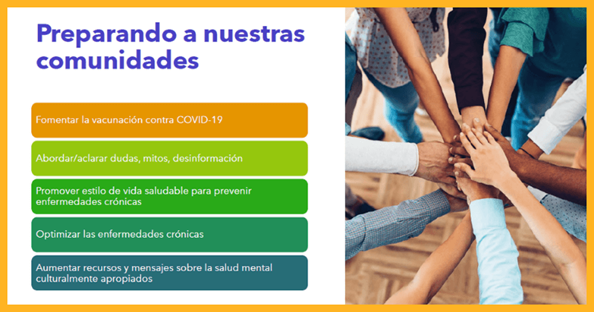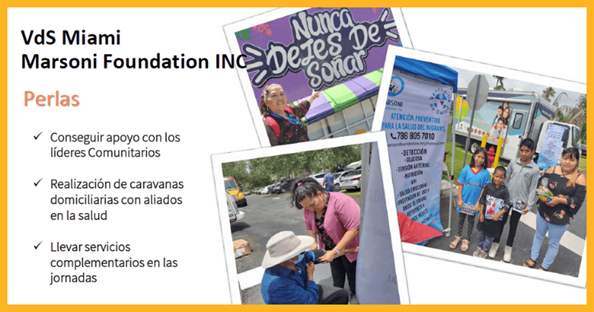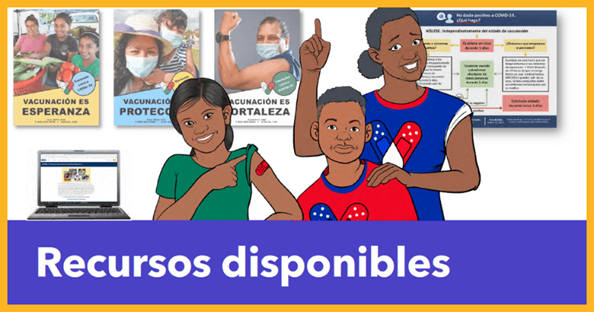How MCN’s engaging, useful learning collaborative breaks free of the COVID learning burnout

Editor’s Note: In 2022, CDP awarded a $200,000 grant to Migrant Clinicians Network to foster a community-based approach to strengthening and sustaining COVID-19 prevention programming while addressing the ongoing impact of the pandemic for the marginalized population of migrants which they serve.
This impact story originally appeared on the Migrant Clinicians Network blog in February 2023 and was written by MCN Assoc. Dir. of Communications Claire Seda.
Trainings on COVID, again? How MCN’s engaging, useful learning collaborative breaks free of the COVID learning burnout
When Migrant Clinicians Network proposed to run a four-part learning collaborative for the promotores at Ventanillas de Salud (VdS) across the country, even the National Coordinator of the VdS, Hilda Dávila, had some doubts.
“We all have severe burnout around COVID. Nobody wants to talk about it – but COVID is still here, and it’s here to stay,” Dávila admitted, when recalling her first reaction to the learning collaborative. “People feel like they’ve already read everything about COVID, they have had the vaccines, they do the mitigations and the screenings – so what else can they learn? It is truly fantastic, what happened – it turns out we could learn a lot.”
Over the course of four one-and-a-half-hour participatory sessions, conducted entirely in Spanish, VdS promotores from across the United States received updates on long COVID; learned how to differentiate common respiratory diseases from COVID, like RSV and influenza; discussed mental health and the pandemic; dug into the disproportionate impacts to immigrant communities; COVID and vaccines during pregnancy and breastfeeding; emergency preparedness; and misinformation and disinformation.
The promotores could then take their new skills, resources and information back to the VdS office where they work to help visitors to Mexican Consulates gain access to preventative care and to find a medical home at a local health center.
“There are so many social determinants that affect immigrants’ ability to obtain health care,” Dávila noted. “Not only poverty – but barriers around English, cultural barriers, and also when you have a job that doesn’t have sick leave or you lack health insurance.”
The VdS seeks to reduce these barriers with events focused on vaccination, preventative screenings, and medical care connection provided in culturally and linguistically relevant ways. This learning collaborative sought to provide these promotores with updated information, culturally relevant tools and resources, and a community platform to support each other in their continued efforts as the pandemic wears on.
To provide engaging and collaborative programming, each session focused on delivering four key components:

Capacity building was provided by the MCN project team in the form of evidence-based, up-to-date COVID information; strategies to debunk mis- and disinformation; self-care techniques through MCN’s Witness to Witness; and disaster preparedness for future public health emergencies.
Eva Galvez, MD, a member of MCN’s Board of Directors who serves mostly immigrant patients at her community health center in Oregon gave easy to understand clinical updates at each session.
“She is truly a great disseminator of information – a really good teacher,” Dávila noted.

Lived experience focused on highlighting the ongoing work that promotores are conducting in their own communities. To encourage sharing of information and strategies, each session featured piedras y perlas, or “stones and pearls”, where challenges and successes were voiced.
“It was so empowering for community health workers to get the opportunity to highlight the things they had learned and what had helped them to be successful,” noted Renée AboAmshe, MHA, LPN, CHES, MCN’s Program Manager, who was a part of the MCN team that put on the learning collaborative. “They got positive feedback from the group, and [others] wanted to try it in their own communities.”
This participatory portion was a highlight for Dávila as well, who appreciated the engaging element to each session.

Dissemination came in the form of new resources. Each session featured a few minutes looking at featured resources and how they could be adapted and customized for different communities. For example, Alma Galván, MHC, MCN’s Director of Community Engagement and Worker Training, reviewed our new Communications Manual in Spanish to help the participants get to know the resource and how to use it for campaigns in their own communities.
Assessment was also woven into every session. For the last few minutes of the session, the group turned their attention to Pulso de la sesión, the pulse of the session, where participants together, while still together in the session, filled out their evaluations. Evaluations were then analyzed and the MCN learning collaborative team came together to determine in what ways they would adjust the following session based on the feedback provided in the Pulso de la sesión.
“During our first session, we talked about the COVID vaccination series – you get your first two doses, then wait, then get the booster, depending on the manufacturer,” said Esther Rojas, MCN Project Coordinator. “That part of the training came up in the Pulso de la sesión. Maybe the information wasn’t absorbed well, so we restructured the way we gave that information. Alma kept them on their toes – giving them polls during the session so they could test their knowledge,” and so the team could ensure their second attempt was more successful.
This learning collaborative equipped the promotores to provide care to their communities with renewed enthusiasm, plus relevant and trustworthy information, tested strategies and customizable resources, to help keep people safe from COVID, and to continue to build trusting relationships with the community so that quality, culturally and linguistically appropriate health information can be delivered when crises like the pandemic arise. This was the first of four learning collaboratives that MCN is providing on COVID in 2023 under a grant from the Center for Disaster Philanthropy. Each one will include these critical components to ensure the materials aren’t just presented via a lecture.
“I was amazed, because everyone was so enthusiastic, and the opinions that were expressed were so good,” Dávila noted. “I was worried that burnout had reached us, and they were going to say, ‘How come you’re doing four 1.5-hour sessions on COVID? I didn’t want to see the numbers dropping off [over the course of the four sessions] – but they didn’t. People were enthusiastic, they were participating…. Time flew.”
CDP is proud to support MCN’s efforts to build capacity and provide training for community-based healthcare workers to continue to support recovery from the impacts of COVID-19 within migrant communities.